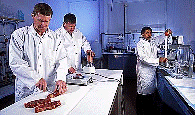United States Department of Agriculture: Agricultural Research Service, Lincoln, Nebraska

Roman L. Hruska U.S. Meat Animal Research Center: Reports
Date of this Version
2013
Document Type
Article
Citation
J. Anim. Sci. 2013.91:1141–1142 doi:10.2527/jas2013-6231
Abstract
The Physiology and Endocrinology Symposium titled “The Current Status of Heat Shock in Early Embryonic Survival and Reproductive Efficiency” was held at the Joint Annual Meeting in Phoenix, AZ, July 15 to 19, 2012. In recent years, data has accumulated indicating a role for heat shock proteins (HSP) in early embryonic development and reproductive efficiency. An understanding of how these proteins influence reproductive efficiency both in vivo and in vitro could have major ramifications for production agriculture. In cattle, performance differences have been identified in Bos indicus breeds and genetic polymorphisms in HSP70 have been associated with reproductive performance (Rosenkrans et al., 2010). In Holstein cows, differences in expression of genes in the HSP40 family have been associated with improved early embryonic development in vitro, indicating that these proteins may have a greater role in reproductive efficiency than thought, even in animals not adapted to a tropical environment and not placed in a heat stress situation (Zhang et al., 2011). The speakers at this Physiology and Endocrinology Symposium were identified to address these topics based on their research.

